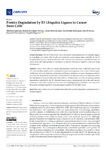Protein Degradation by E3 Ubiquitin Ligases in Cancer Stem Cells [Review]

Ver/
Use este enlace para citar
http://hdl.handle.net/2183/30683
A non ser que se indique outra cousa, a licenza do ítem descríbese como Atribución 4.0 Internacional
Coleccións
- Investigación (FCS) [1293]
Metadatos
Mostrar o rexistro completo do ítemTítulo
Protein Degradation by E3 Ubiquitin Ligases in Cancer Stem Cells [Review]Autor(es)
Data
2022-02-16Cita bibliográfica
Quiroga, M.; Rodríguez-Alonso, A.; Alfonsín, G.; Rodríguez, J.J.E.; Breijo, S.M.; Chantada, V.; Figueroa, A. Protein Degradation by E3 Ubiquitin Ligases in Cancer Stem Cells. Cancers 2022, 14, 990. https://doi.org/10.3390/cancers14040990
Resumo
[Abstract] Cancer stem cells are a small subpopulation within the tumor with high capacity for self-renewal, differentiation and reconstitution of tumor heterogeneity. Cancer stem cells are major contributors of tumor initiation, metastasis and therapy resistance in cancer. Emerging evidence indicates that ubiquitination-mediated post-translational modification plays a fundamental role in the maintenance of cancer stem cell characteristics. In this review, we will discuss how protein degradation controlled by the E3 ubiquitin ligases plays a fundamental role in the self-renewal, maintenance and differentiation of cancer stem cells, highlighting the possibility to develop novel therapeutic strategies against E3 ubiquitin ligases targeting CSCs to fight cancer.
Palabras chave
E3 ubiquitin-ligase
Cancer stem cells
Post-translational modification
Protein degradation
Ubiquitination
Cancer stem cells
Post-translational modification
Protein degradation
Ubiquitination
Descrición
The aim of this review was to discuss the fundamental role of E3 ubiquitin ligases in controlling cancer stem cells. It will be surmised that protein degradation controlled by the E3 ubiquitin ligases plays a fundamental role in the self-renewal, maintenance and differentiation of cancer stem cells, highlighting its potential as an effective therapeutic target for anticancer drug development.
Versión do editor
Dereitos
Atribución 4.0 Internacional
ISSN
2072-6694






